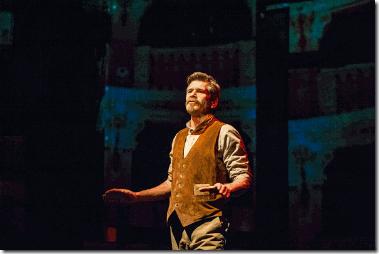The Edward Curtis Project: Visuals Aren’t Enough
Todd Duckworth as Edward Curtis. Photo, Andrew Alexandre
THE EDWARD CURTIS PROJECT, written and directed by Marie Clements, typifies a problem that’s becoming all too common in contemporary theatre. The technical production far outstrips the script, which I hesitate to even call a play. Rather, it’s more a disjointed sophomoric polemic on the plight of Aboriginals. When I end up with four pages of notes, all on the set, projections and music, it’s a sure sign that something’s out of kilter.
The story is centered on Angeline, a traumatized Aboriginal journalist. However we don’t get a full picture of her traumatic experience until near the end of the piece, so much of the earlier material is merely confusing. As for Edward Curtis, the controversy regarding him and his photographs isn’t mentioned. In order to get the point, one needs a deeper knowledge of his work than can be gleaned from the sketchy script.
That said, the physical production is terrific. Ivo Valentik’s set consists of a couple of platforms center backed by a large screen. It’s topped with many smaller screens and enclosed by wings made of scrim, all available for projections, photographs and film. Projection Designers Jamie Griffiths and Tom Matheson have achieved some wonderful effects. The magically appearing handwriting is especially stunning. John Weber’s lighting is good, isolating playing areas and contributing to the ambience.
Barbara Clayden’s costumes are just fine. That for Mrs. Curtis and Dr. Clara, both well-played by Kathleen Duborg, is cleverly flexible. Bruce Ruddell’s music and sound, designed with Troy Slocum, is excellent. Particularly haunting is the use throughout of snatches of “Let the Rest of the World Go By.”
As Angeline, Quelemia Sparrow certainly suffers, but thanks to the confused script, some of the earlier scenes come off as a bad case of the sulks. She’s strongest in relating her truly traumatic experience. Kevin Loring and Todd Duckworth both give solid performances as Angeline’s boyfriend and Edward Curtis, respectively. They have a nice scene together featuring bacon and eggs, one of the few portraying a true human connection.
This production is a good argument against a playwright directing their own work. Obviously Miss Clements’ ideas are so clear to her that she assumes we’ll follow, despite the weaknesses of the script. She knows it too well to be objective.
Like METAMORPHOSES and INNOCENCE LOST, the theatricality of the production can’t hide the fact that there’s no “there” there. First write a solid play – dress it up later. It’s said that everything’s better with bacon – just not this play.
Irving Greenberg Theatre through April 21
THE EDWARD CURTIS PROJECT by Marie Clements
Great Canadian Theatre Company/National Arts Centre co-production
Director: Marie Clements
Set: Ivo Valentik
Costumes: Barbara Clayden
Projection Designer: Jamie Griffiths
Projection Designer & Production Photographer: Tim Matheson
Lighting: John Weber
Composer & Sound Designer: Bruce Ruddell
Sound Consultant: Troy Slocum
Singer & Songwriter: Leela Gilday
CAST
Clara Curtis/ Dr. Clara: Kathleen Duborg
Edward Curtis/Chief: Todd Duckworth
Yiska/Translators: Kevin Loring
Angeline: Quelemia Sparrow
